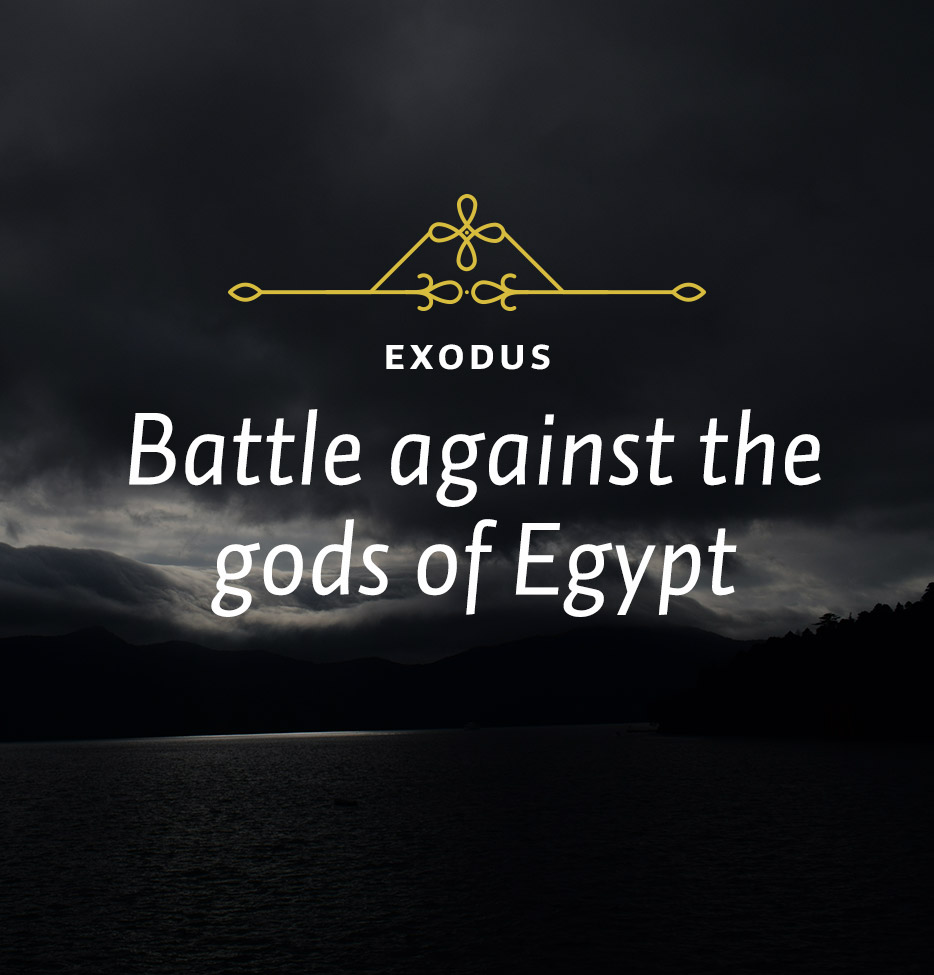No more warnings would be given. The ninth plague came suddenly and without any announcement whatsoever. Darkness descended upon the land, and it lasted for three days. That was the most significant judgment of all in terms of Egyptian religion, because the greatest of all the gods was the sun god Ra, and Pharaoh was considered the incarnation of Ra. Pharaoh Akhenaten composed a hymn to the sun (named Aten in the poem), one of the greatest surviving remnants of Egyptian literature. Part of it goes like this: “Thy rising [is] beautiful in the horizon of heaven, O Aten, ordainer of life. Thou dost shoot up in the horizon of the East, thou fillest every land with thy beneficence.”
And yet Ra, Aten, was nothing at all. With the darkness, the great god of the sky was blotted out. But not only was Ra, the sun, blotted out; even the stars, the planets, the moon, and the lights of the night were blotted out as well. Donald Grey Barnhouse describes this in particularly vivid terms:
Gross darkness could be a normal thing in the land of the midnight sun, but this was not Norway or Alaska, this was Egypt. This was the land of perpetual sunshine. Three hundred and sixty-five days in the year, the sun shines in Egypt. And three hundred and sixty-five nights in the year, the skies are so alight with moon and stars that there is little like it to be seen from earth. The planets seem nearer than the lights of neighbors, and the stars hang in the sky, liquid in their trembling beauty. Through our fogs, the heavens may be millions of light years away, but in Egypt they seem to be just out the window and just beyond the tree tops.
Suddenly the sky and the light were eclipsed by a phenomenon that fell upon the land. The verb is one that denotes swiftness as when a lion falls upon an unsuspecting prey. Life came to a halt. The people were forced to remain in their beds for three days…. Provisions are not stored up in hot lands, and there was no refrigeration in those days. The people were without food; they could not see each other; they lived, choking and gasping, in their beds.1
Yet even at this point, Pharaoh refused to let the people go.
Well what happens next, of course, is the death of the firstborn. It’s so linked with the Passover and the directions for it that we have to consider those two events together, which we will do next week. But there are some applications from what we have been looking at in these first nine plagues.
The first application is that there is only one true God. We don’t have much polytheism present in the West. And we are certainly not polytheistic as the Egyptians were. Yet anything can take the place of God. You can have something in your life that’s more important to you than God, and in that sense you have another god. That’s why the Ten Commandments begin by saying, “You shall have no other gods before me.” This means that God will not compromise with idolatry. Are there things that are functioning as gods in our lives? If there are, are we willing to repudiate them?
The second application is that there are false gods that need to be countered today. These false gods don’t always go by the names of gods. But anything that sets itself up against God is a god, and we need to oppose it. Sometimes it’s patriotism. “My country first, right or wrong.” That’s idolatry. You need to oppose that kind of philosophy. Secularism humanism is an idolatrous philosophy. There’s a right kind of humanism, which is a concern for people. But humanism that exists as an ideology unto itself needs to be opposed. Is there anything that you as a Christian can oppose for the sake of righteousness and the sake of Jesus Christ?
The third application comes from the experience of Pharaoh. You cannot compromise with God. Pharaoh wanted to compromise with God, once he understood that God was more powerful than he was. But it wouldn’t do. God wouldn’t compromise. God has a sovereign will and that means a will that doesn’t compromise. Those who oppose Him will be broken ultimately, just as Pharaoh was. Are we fighting against God in some area? Are we trying to oppose His sovereign will in our lives? It’s a very foolish thing to do, because those who oppose Him will be broken. What we should learn to do is submit ourselves to Him wholly as the wise, sovereign, all-powerful, and exceedingly gracious God.
1Donald Grey Barnhouse, The Invisible War: The Panorama of the Continuing Conflict Between Good & Evil (Grand Rapids: Zondervan, 1965), 210.






